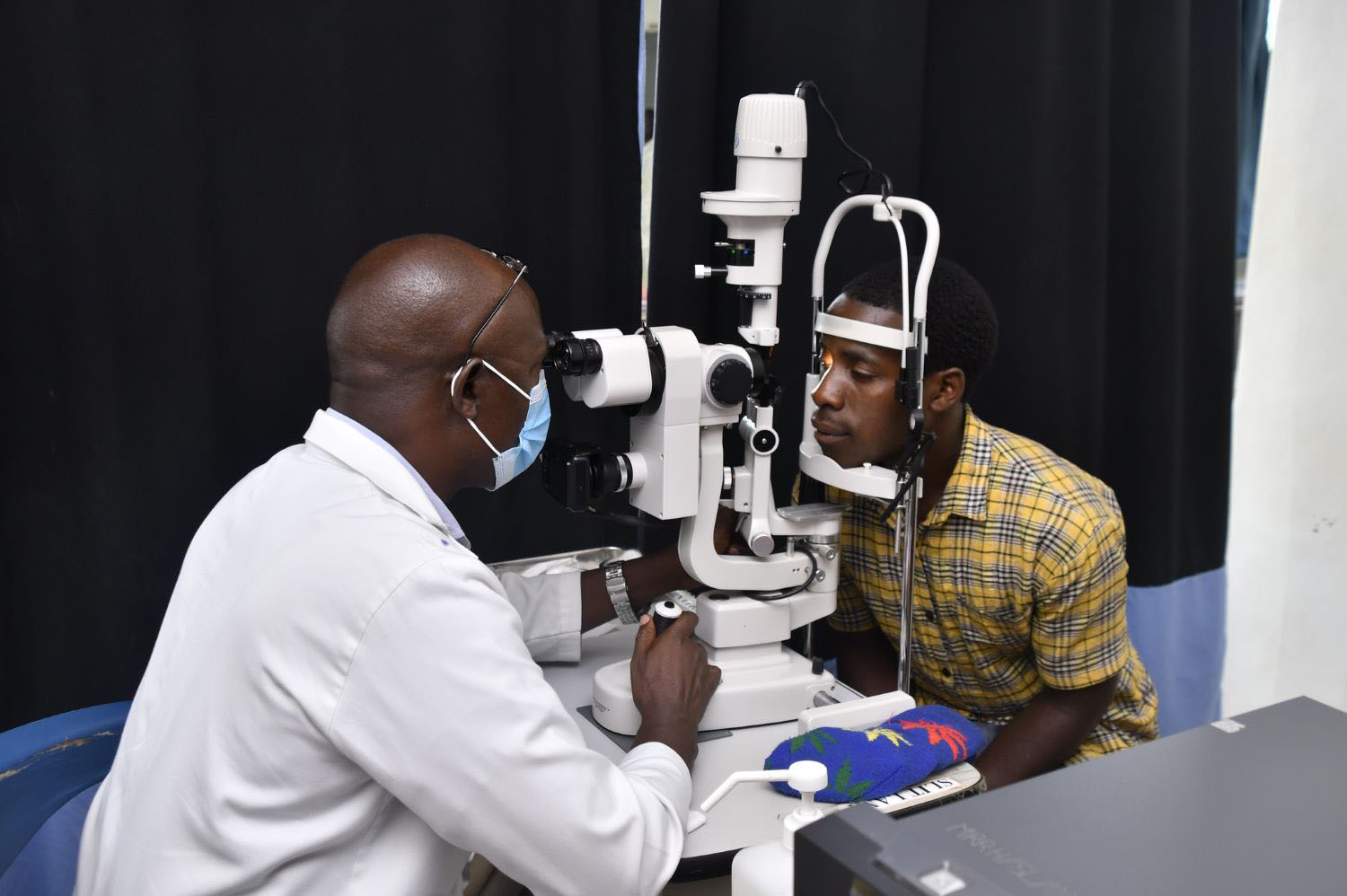Did you know that January is National Mentoring Month? I had no idea until recently when the Center for Global Development launched a new internal mentorship program, prompting me to reflect on what mentorship means to me.
What’s the most important skill to learn?
My story starts while I was studying in my master’s program at Harvard. Recalling Mark Twain’s adage, “Don’t let school get in the way of your education,” I had organized an informal club of like-minded classmates called “Global Health Entrepreneurship and Innovation Incubator”, which invited guest speakers.
Once we invited Dr. Jim Yong Kim. At that time, he was the director of the FXB Center for Health and Human Rights at Harvard. We were thrilled when he accepted our invitation. As usual, we asked one of our default questions: What is the most important skill for us to learn?
Back then, I was keen on gaining new skills—be it impact evaluation, statistics, or finance; I was certain he would suggest that a hard skill is what we most needed to learn.
But to my shock, if my memory serves me correctly, he said something to the effect of: “The most important skill you should learn as a graduate student is how to cultivate relationships with your mentors.”
This advice was mind-blowing for me.
Don’t let school get in the way of your education
I had already pored through the course catalogs at Harvard and made lists of which subjects I needed to learn. Nowhere was there listed a course: “Mentorship 101: How to Cultivate Relationships With Mentors.”
Alas, Mark Twain’s advice rung true—I should not have let school and its predefined, explicit curriculum get in the way of my education, including tacit knowledge—or knowledge that is gained by doing. At best there might be a course on leadership or communication, but even those courses were dismissed as something we could learn “on the job.”
The more I thought about Jim Kim’s advice, the more it made sense. I imagined that his professional success was in no small part due to his ability to form relationships with wise but also powerful individuals who could help him reach his goals and make his dreams come true. How else could it be that he and Paul Farmer could establish an outstanding non-profit organization, Partners in Health, right next to Harvard Medical School, or that he landed a job at the World Health Organization to lead HIV? Thus, I imagined how his advice rang true for himself.
Relationships require your effort
Afterward, I spent much time reflecting on how I had interacted with my mentors till that point. In college I worked in different labs as part of MIT’s flagship Undergraduate Research Opportunity Program, but not once did I recall hearing the phrase “mentorship”.
I thought about how I engaged with each professor and realized that the notion of a mentor was entirely foreign. How was this distinct from a teacher? Could I even do this thing of “cultivating relationships with mentors”? Was it a matter of luck or circumstance?
Yet even Jim Kim’s phrase of “cultivating a relationship” implied that some effort and skill was required by the mentee. But I was completely stumped. Never before had I considered my professional or research endeavors as a relationship. I had to completely reconsider how I engaged with my professors.
Since then, I cannot say that I have mastered the skill of cultivating relationships with mentors, including in global health. But I have been blessed with many good mentors and teachers in my professional career. Here is what (little) I have learned about how to build those relationships.
Find out what motivates your prospective mentor
Mentors are just people. They are not gods or superheroes. As accomplished as they may be, they started out just like you.
Mentors too have ambitions, preferences, desires, and wants. Those seeking a mentor should try to understand what motivates their potential mentor.
My mentor Bill Hsiao always wanted to know what research I was interested in. He was never pushy about advancing his own research agenda on me. He never suggested that I work on his projects. He demonstrated that a good mentor is not selfish and does not advance their personal interests.
I’ve been blessed with mentors who are genuinely interested in me as a person, who ask me questions not only about where I want to go, but also where I am from and what shapes my perspectives. In 2011 my supervisor and mentor Amanda Glassman asked me on my first day on the job, “What’s your dream?” The directness of her question stills resonates and is now a question that I ask my mentees!
The best mentor is unselfish
When I realized that my mentors get little out of being my mentor, a sense of gratitude and appreciation overwhelmed me. In some sense, the best mentor is just a good person.
But I still wondered, if my mentor seems to be unselfish, why are they being unselfish?
I’ve come around to my own answer: If I need a reason to be a mentor, it is to pay it forward. I have benefited from much mentorship in the past, and the only way to repay it is to pay it forward. There’s no other way.
During graduate school, I saw several students get caught in a slightly extractive power dynamic with their professors, in which the student was stuck working for a professor or for which they do not receive adequate credit or recognition (one of many dark aspects of academia).
Now when I talk with my supervisees or mentees, I try to make it clear which hat I’m wearing when I’m telling them something—the supervisor hat or the mentor hat. They are different roles.
While mentors should inspire you to be better than you are, in the end they are just human. It’s important not to exaggerate their qualities and view them with equanimity.
Relationships are reciprocal
Cultivating a relationship implies something mutual between two people. That mentoring relationships are reciprocal means that while your effort is necessary, connections cannot be forced. There is an aspect of “hitting it off” or “clicking with” with someone as a possible mentor, just like with friends. Even if you really want to have someone as your mentor, they may not want to be your mentor. Likeability and friendliness are necessary, but not complete conditions for mentorship.
I once heard Tony Fauci say about Paul Farmer that it was Paul Farmer who mentored him—which goes to show that mentoring can go both ways and is not just a one-way street.
The mentee should ask themselves what they bring to a relationship and understand their own motivation. While a student or young professional may feel at a loss for what they bring, you should remember the many things you have. You have your idealism and passion, your questions and your ideas. You have not been contaminated by “the way things are done.” And you have kindness, hard work, and perhaps most importantly, you just being you.
Relationships are built on communication
I was fortunate while at the University of Hawaii (UH) to be nominated by my mentor Kathryn Braun, to apply for the Presidential Emerging Leaders Program. I was lucky to be accepted and meet a cohort of university leaders. This program offered a fantastic workshop on leadership and communication, emphasizing that each person has one of four leadership and communication styles.
One communication style is relational. It blew my mind that there are those who make executive decisions not on hard evidence or facts, but on relationships. This lesson reinforced the importance that relationships are built with communication. But how does communication build relationships and what kind of communication builds relationships?
Don’t neglect your own rich wisdom traditions
As a university professor, I gained an enlarged concept of what it means to be a mentor, not just by virtue of being a teacher, but also by being at a university that aspires to be a “Place of Native Hawaiian Learning.” Rich Hawaiian culture cherishes values such as “aloha” (love), “mālama” (to care for), “e ho‘omālamalama i kō mālama” (cultivating the potential within each member of our community), “moʻokūʻauhau” (the many genealogies that shape us), “kaikua‘ana and kaikaina” (intergenerational and interdependent relationships), “kuleana” (responsibility) and so much more.
Even the word for teacher or guide “kumu” has deep and special meaning. The process of translation is imperfect if not impossible, leading to inevitable loss of the larger original meanings.
I also reflected on the wisdom traditions of my own heritage. Growing up, I had learned the phrase 廣結善緣 (guang jie shan yuan), which is crudely translated as “Make good connections with many.” Recognizing our interdependence, including through our speech and words, I reflected on the importance of using words that are gentle and not harsh, harmonious over divisive, truthful and not deceptive, and meaningful and not frivolous.
Passing it on to the next generation
Years ago, I learned the Ministry of Public Health in Thailand uses an intergenerational or cohort approach in sending staff to attend the World Health Assembly. The same staff did not attend every year. Last year’s cohort, or batch, trains the next year’s cohort on how to attend the World Health Assembly. There was a clear lineage that was transmitted and passed on, from one generation to the next.
My mentor Steve Kuo taught me this idiom: In the Yellow River, the next generation wave pushes forward the prior generation wave (長江後浪推前浪). Even the phrase “passing it on” (傳承) is everyday parlance in many parts of East Asia, but importantly has an aspect of passing on responsibility.
Long a skeptic of Confucianism, I have come to value how intense awareness of age has practical value in terms of intergenerational transmission of knowledge through relationships. Seniors are responsible to train juniors. There are specific words that identify the relational of upper and lower, or senior and junior classmate in Chinese (學長, 學弟) and Korean (선배,후배). Those intergenerational relationships stick long into professional careers and beyond.
The closest experience I have had with such an intergenerational concept in the US was in college when I joined a sorority. Each new member was assigned a “big sis”, who guided us through the ropes of college and was also just a friend to us, someone you could go to for advice.
Mentorship is voluntary and not monogamous
A mentoring relationship is voluntary, but it is also a privilege to call someone one’s mentor. So I think it is important to formally request it. When I develop a good rapport with someone whom I want to be my mentor, I usually ask them if it is okay that I call them my mentor.
Do not take their time for granted. Even 10 or 15 minutes is a lot of time, as time is our scarcest resource (I learned this from my mentor Doris Ching).
You are not limited to just one mentor. You can have multiple mentors, just as you can have multiple friends. Thinking of mentors in this way can make mentorship less intimidating.
It’s hard to say that mentors “teach” in any formal manner. But instead by observing their way of being, one gains insights. While in this piece I’ve reflected only on how to cultivate a relationship with a mentor, I have not even begun to list out every mentor and all the lessons that I learned.
You’re not alone
The moment that you realize you need a mentor is the path to finding a mentor. It will take time and some awkwardness, but mentorship is for everyone. Today you may be a mentee, but tomorrow you will be a mentor. Do not underestimate your unlimited potential, as my teacher Master Cheng Yen said.
Sometimes, I think the US culture of rugged individualism can be harmful if one thinks that one does not need help from others. With severe mental health and substance abuse challenges in the US, not to mention extensive social isolation, loneliness, and phenomena like “Bowling Alone”, it’s possible that the US has a less mature culture of mentorship.
But I’m glad to see it’s changing over time. As a former cultural anthropology major, I can definitely say that culture is dynamic, as is our way of being, so I leave you with Ralph Waldo Emerson’s words:
“Sow a thought and you reap an action; sow an act and you reap a habit; sow a habit and you reap a character; sow a character and you reap a destiny.”
Since I have benefited from many wonderful mentors, too many to mention and whose wisdom I’ve received, I too hope this advice can benefit others. All I have left to express is my gratitude and to pass it forward.
Disclaimer
CGD blog posts reflect the views of the authors, drawing on prior research and experience in their areas of expertise. CGD is a nonpartisan, independent organization and does not take institutional positions.
Image credit for social media/web: Adobe Stock





